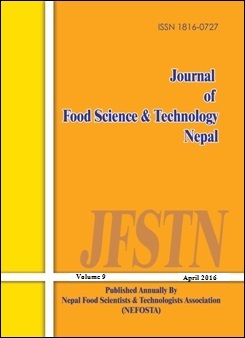Interactions of Bio-macromolecules During Processing of Instant Asian Noodles: A Review
DOI:
https://doi.org/10.3126/jfstn.v9i0.16197Keywords:
Instant Noodles, Biochemical reaction, Nutritional aspects, Processing, QualityAbstract
The review focuses on how the protein, fats, carbohydrates and water interact and form the complexes during different stages of processing of instant noodles. Moisture is needed for dough formation and chemical interactions therein. Appropriate moisture content is required for proper gelatinization of noodle strand during steaming and eventually moisture is evaporated
off by drying and frying to increase its shelf life. Frying oil may undergo degradation process invited by high frying time and temperature, high moisture in oil and polyvalent metals. Various intermediate products like dimers and polymers accelerate the oil degradation finally changing the physiochemical properties of oil rendering it unacceptable for processing. Gliadin
and glutenin gives noodle its viscoelastic character. The polymeric glutenin network develops throughout the process of mixing, resting and subsequent stages of sheeting. Protein content and amylose content in noodle are inversely proportional to the oil uptake ratio. Another possibility is the non-enzymatic browning reaction during frying of instant noodles.
Downloads
Downloads
Published
How to Cite
Issue
Section
License
The author will be the copyright holder of this open access journal - 'Journal of Food Science and Technology Nepal (JFSTN)'.




